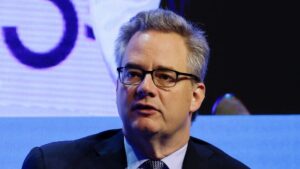The Changing Landscape of Leadership at BlackRock: What It Means for Investors
At the recent Global Financial Leaders’ Investment Summit held in Hong Kong, Mark Wiedman, a key figure in the world of asset management, announced his departure from BlackRock after an impressive two-decade career. As the head of BlackRock’s global client business for the past two years, Wiedman had long been considered a frontrunner to succeed Chief Executive Larry Fink.
A Legacy of Growth and Innovation
Wiedman’s track record at BlackRock is nothing short of remarkable. He was pivotal in propelling the firm’s dominance in passive investing, particularly during his tenure leading exchange-traded funds (ETFs) and index strategies from 2011 to 2019. Under his stewardship, assets in this segment skyrocketed from $500 billion to an astonishing $1.7 trillion. This aggressive expansion reflects not only market trends but also Wiedman’s strategic foresight and execution.
Joining BlackRock in 2004, he played a crucial role during the financial crisis by overseeing emergency assistance to governments and financial institutions. His depth of experience at one of the world’s largest asset managers brings unparalleled insight into navigating both opportunities and challenges in the financial landscape.
What Does This Mean for BlackRock and Investors?
BlackRock, currently managing a record-breaking $11.5 trillion in assets, continues to evolve, especially through its recent acquisitions aimed at strengthening its foothold in private credit and alternative investments. Notably, BlackRock’s purchase of HPS Investment Partners for $12 billion and Global Infrastructure Partners for $12.5 billion underscores its commitment to diversifying beyond traditional asset classes.
For investors observing BlackRock’s next chapter, the question looms: How will Wiedman’s departure affect the firm’s strategic direction? With the asset manager aggressively pivoting towards private equity and new investment strategies, leadership continuity and vision are critical factors to watch.
Preparing for Future Trends in Asset Management
As we at Extreme Investor Network analyze these developments, it’s essential to consider how shifts in leadership can influence investment paradigms. BlackRock’s substantial investment in private credit indicates a broader trend in the industry. As market conditions shift, alternative investments are gaining traction among institutional and retail investors alike.
Investors should keep a close eye on how BlackRock adapts its strategy in light of these leadership changes. The firm has consistently proven its ability to respond to market demands, but how it will innovate going forward—especially under new leadership, should concrete succession plans be implemented—will be a focal point of interest.
Final Thoughts
The financial landscape is invariably influenced by leadership changes in key institutions, and the departure of a seasoned executive like Mark Wiedman is no exception. At Extreme Investor Network, we are committed to delivering insights that empower our readers to navigate these shifts confidently. Keep following us for the latest updates and analysis on market trends, investment strategies, and the evolving landscape of asset management.
Staying ahead in finance requires foresight, preparation, and continuous learning. Together, we’ll explore opportunities in this new era of investment innovation.

